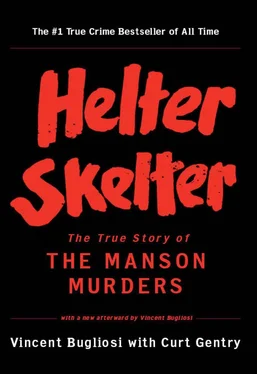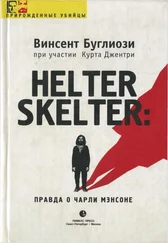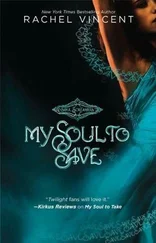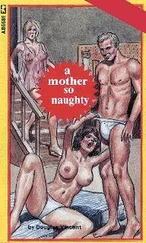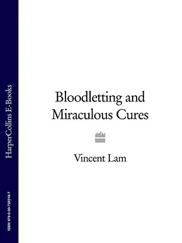True “solitary confinement” does not exist in the California prison system today. Inmates still use the popular term, however, to refer to the situation where no other inmate shares their cell with them and they are segregated from the general prison population, mingling only with selected prisoners. Manson has spent the majority of his twenty-three years of incarceration for the Tate, LaBianca, Shea, and Hinman murders in this type of housing.
At Vacaville in August of 1980 Manson was given his first prison job—gardener and maintenance man for the Protestant chapel. “It’s taken me ten years to get a breath of fresh air,” he said. “I’m not about to screw up.” Maintaining a clean disciplinary record for close to two years, in June of 1982 he was placed, per his request, on the “main line,” the general prison population. Manson’s resolve not to screw up lasted (or the lack of it remained undiscovered) until October 29, 1982, when a hacksaw blade, along with marijuana, was found in his cell. [96] Also, upon his arrival back at San Quentin from Vacaville in 1985, a four-inch piece of a hacksaw blade was found in his shoe. How does one reconcile Manson’s apparent interest in escaping with his desire at Terminal Island in 1967 to stay behind bars? Prison had become his home, he told the authorities back then, and he didn’t think he could adjust to the world outside. Even today, I suspect that Manson isn’t miserable or even unhappy behind bars. Having spent forty-two of his fifty-nine years in jails, reformatories, and prisons, he obviously has become totally institutionalized, and therefore most likely isn’t uncomfortable in an incarcerated setting per se. However, after he got out in 1967 he undoubtedly learned to like having a harem of girls (“Up in the Haight, I’m called the gardener. I tend to all the flower children,” he had told Squeaky when they first met) and riding dune buggies up and down the desert more. Further, like never before, Manson now has to look over his shoulder. He knows that any con who wants to make a name for himself can kill him and then he becomes famous.
A subsequent search of the chapel uncovered four bags of marijuana, one hundred feet of nylon rope, and a mail-order catalog for hot-air balloons. If Manson couldn’t hack his way out of prison, he apparently was thinking of “flying the coop.” In what must be considered a vapid display, prison officials actually asked the state attorney general’s office to file possession of marijuana charges against the man serving nine concurrent life sentences for nine murders, but saner counsel prevailed and no charges were filed.
While at Vacaville, Manson refused to take part in group psychiatric therapy and largely just played word games with psychiatrists during the individual sessions he consented to. One psychiatric evaluation of Manson made by prison doctors stated: “He has above-average intelligence, and the [Rorschach test] drawings seem to point to schizophrenia. This doesn’t mean his entire performance was schizophrenic…Manson is a passive-aggressive personality with paranoid tendencies.”
Manson’s response? “Sure I’m paranoid. I’ve had reason to be ever since I can remember. And now I have to be, just to stay alive. As for schizophrenia, take anybody off the streets and put them in the middle of a prison and you’ll see all kinds of split personalities. I’ve got a thousand faces, so that makes me five hundred schizophrenics. And in my life I’ve played every one of those faces, sometimes because people push me into a role, and sometimes because it’s better being someone else than me.” After spending a short time in the psychiatric ward at Vacaville, Manson was transferred out on the recommendation of a psychiatric report which said he was nothing but “a psychiatric curiosity or oddity.”
Knowing he may well spend the rest of his life in prison, Manson has either boycotted his parole hearings since his first one in 1978 or used them merely as a forum to sermonize or simply have some fun. In 1978 he regaled the parole board with his comments for three hours. “I’m totally unsuitable for that world out there. I don’t fit in at all,” a bearded and shaggy-haired Manson allowed in saying he should not be released from prison. But then Manson, never a model of consistency, added: “I’m mad. I’m indignant. I’m mad to every bone in my body that I have to come back to the penitentiary when I didn’t break no law.” Waving his arms in exclamation and half singing his presentation, Manson said, “I’m not your executioner. I’m not your devil and I’m not your God. I’m Charles Manson.” Reminding the board he had spent most of his life behind bars, he said, “I was born and raised all my life in prison.” He told the board he had been “asked to come to Scotland, Germany, Australia,” but that he wasn’t interested. When asked where he would go if released, he responded, “I’d go to the desert, talk to the animals and live off the land.” The parole board, in denying parole, said that Manson’s crime “eclipses the imagination.” The following year Manson sent word from his cell that he had nothing to tell the board, and gave his unit sergeant several $100 bills from a Monopoly set and a Chance card that said “Advance to Go. Collect $200” to deliver to the board members.
Delighting in talking to reporters covering his parole hearings, he told one, “You’re in prison more than I am. You’ve got more rules to live by than I do. I can sit down and relax. Can you?” Grabbing another reporter’s arm and pressing his mouth close to her ear, he whispered, “Do you know a way out of here? If you get me out, we can go to the desert and I’ll show you things that’ll blow your mind.”
At his parole hearing in 1981, Manson, in a T-shirt with a small skull and crossed bones, repeatedly stood, sat down, paced, and interrupted the hearing, frequently shouting at the board members. He told the board: “I’ve been in solitary for ten years. I ain’t got no mind. It’s gone, man. I don’t understand half the things you’re saying.” Then, “I never really grew up. I went to prison at nine. I don’t read or write too good and I’ve stayed like a little kid. I stopped thinking in 1954.”
In 1986, Manson did not appear at his parole hearing, sending the board, instead, a lengthy written statement. “All of the judgments and the blame that is pushed off on me will be reflected back in the fires of the Holy War that you call crime,” he wrote. “I did invoke a balance for life on Earth. From behind the time locks of courtrooms and from the worlds of darkness, I did let loose devils and demons with the power of scorpions to torment. I did unseal seven seals and seven jars in accord with the judgments placed upon me…You’ve drugged me for years, dragging me up and down prison hallways, laying my head on every chopping block you’ve got, chained me, burnt me, but you cannot defeat me…In the all that was said about me, it was not me saying it, and if you see a false prophet, it is only a reflection of your own judgments.”
That same year he wrote President Ronald Reagan at the White House with this advice: “Keep projecting [to kids] what not to do and you make the thought in their brains of what can and will be done.” Before signing off with “Easy, Charles Manson,” he told Reagan: “I’m the last guy in line but I’ve got all the thoughts for the balance of order and peace with a one-world government if we all are to survive.”
At his last parole hearing on April 21, 1992, Manson, the defiant swastika still very visible on his forehead, responded to the accusation he had ordered the murders by telling the three-man parole board (now called the Board of Prison Terms): “Everyone says that I was the leader of those people, but I was actually the follower of the children…I didn’t break God’s law and I didn’t break man’s law.”
Читать дальше
